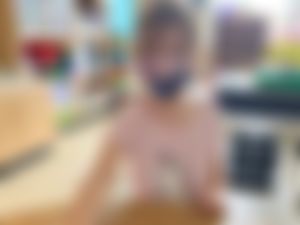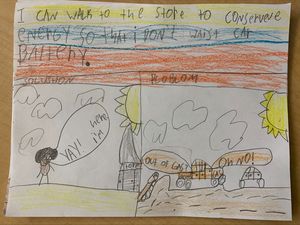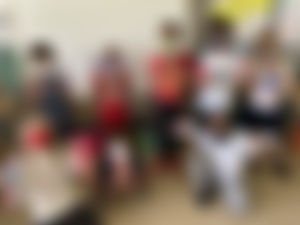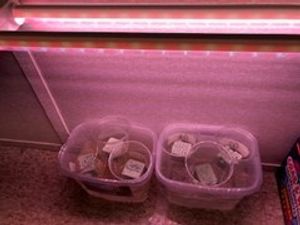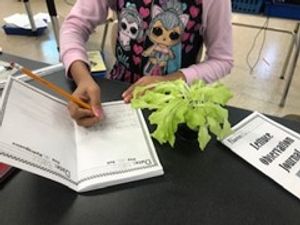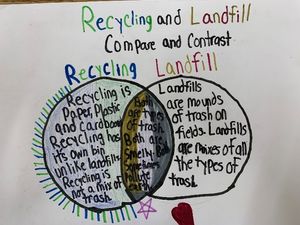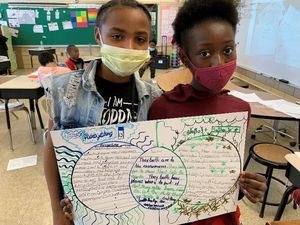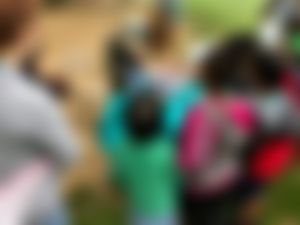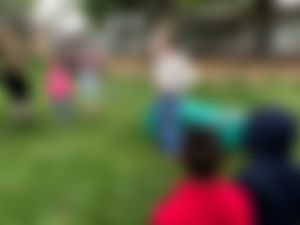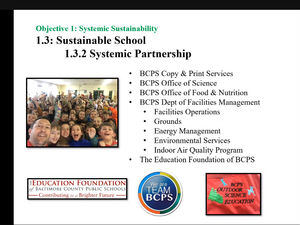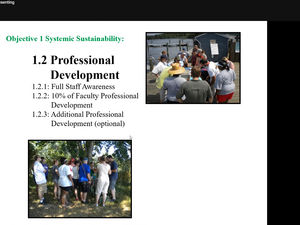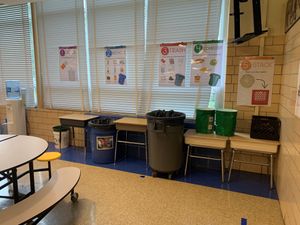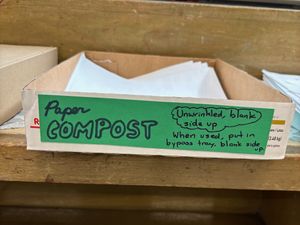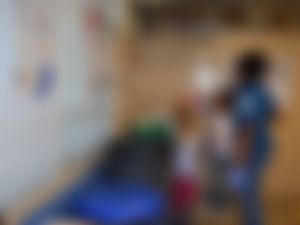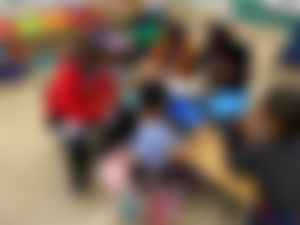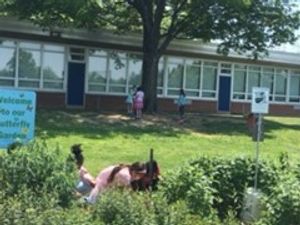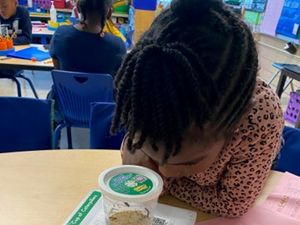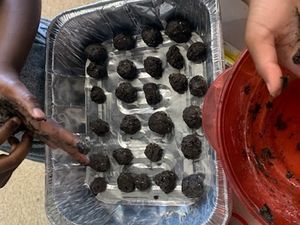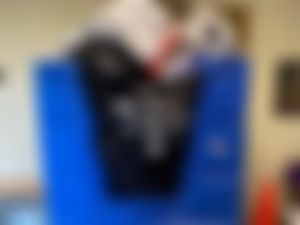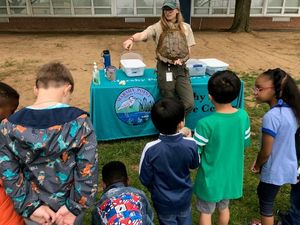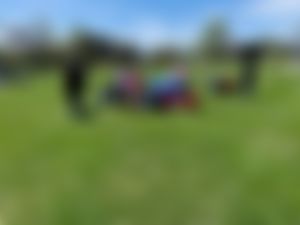Systemic Sustainability
Environmental Curriculum and Instruction
1.1 Curriculum and Instruction
Elementary & middle schools must provide one example of outdoor/environmental instruction per grade level.
High schools must provide one example of outdoor/environmental instruction in four subjects (which may include multiple different differents sciences).
Kindergartener students learned about transportation. Students learned about how transportation has changed over time and how it affects the environment. They also learned about how transportation moves. Students created their own transportation using recycled materials. Students discussed what materials they could reuse in order to reduce waste and then used them to make their own transportation.
During the 2022-2023 school year, 85 first-grade students learned about the importance of conserving energy. Through this lens they explored different ways to conserve energy in our "Sharing the Planet" inquiry unit. In conjunction with these lessons, the first grade constructed research on many different ways to save energy. Next, the students reflected and identified one way of conserving energy that can be used at home. Students created a poster on what they learned about conserving energy and its importance. These posters were displayed around the school building for all to read about the importance of conserving energy.
During inquiry on Earth Day, 2nd grade students learned about the process of recycling both. They discussed which products can or cannot be recycled, took a tour of the TerraCycle Building, and discussed how we can help recycle at home. They partnered up with TerraCycle’s Colgate recycling program and collected used Colgate products. These products were sent into Terracycle, so that they could properly be recycled.
Third Grade researched agricultural explorers and their contributions to the world. Students then decided to further explore the choices they made by determining if crops (lettuce) would have grown better in soil vs. hydroponically. Students kept track of the progress via an observation journal and then gave their final recommendation based on the data they tracked. This final decision could be used to help future explorers settle in new places.
4th grade students learned about text structures- cause and effect, problem/solution, description, compare and contrast, and sequencing. They conducted short, focused research on recycling and composting. The students created posters using one of the text structures in order to motivate the students in the school to use the trash, recycling, and compost bins correctly at lunch time.
Fifth-grade students learned about the importance of biodiversity in the world. Through this lens they explored a variety of food chains as well as the producers and consumers in a specific food chain or web. Using Wellwood’s grounds, the 5th graders learned how to survey the biodiversity of an area. This type of survey has been termed “BioBlitz.” The students located a variety of plants, animals, and insects on several different locations. Students realized, by the end of their field work, that our schoolyard has low biodiversity. Students are currently working on projects to address the lack of biodiversity at our school.
1.2 Green School Awareness
1.2.1 School Wide Awareness - Staff
Demonstrate that all school personnel are aware of your school's Green School status and application process.
During the first week back each school year, staff are provided with professional development about the Green School application process and Wellwood's Green School Initiatives. We also have a Green School Committee that meets 1-2 times a quarter. After meeting, information is shared to staff through their grade level representatives or email.
During inservice week, all staff members participated in a Green School Overview presentation. They learned about MAEOE and the objectives involved with being a MD Green School and the application process. They also learned about our Green School Initiatives at our school.
Wellwood International Sign In Sheet 8.22.22 (823.35 KB)
Picture of Sign-in Sheet
Green School Presentation 2022 (302.28 KB)
A few slides from the staff presentation.
The Green School Committee met monthly to discuss our Green School initiatives and events for the year. Information was shared with the staff through email and grade level representatives.
Green School Agendas 20-21 (326.74 KB)
The agendas from the Green School Committee Meetings from 2020-2021.
The Green School Committee meets quarterly to discuss our Green School initiatives, our current application process and events for the year. Information was shared with the staff through email and grade level representatives.
1.23.24 Green School Agenda.docx (141.86 KB)
The agenda from our meeting for second quarter.
10.24.23 Green School Agenda.docx (116.53 KB)
The agenda from our meeting for first quarter.
1.2.2 School-Wide Celebration
Demonstrate how your school celebrates beig a Green School by hosting a school-wide environmentally-focused event open to all students.
Each year, Wellwood holds our annual school-wide Earth Day Celebration in April. This day is filled with Earth Day themed games, learning stations sponsored by local organizations, and opportunities to teach the community about being green. In Spring 2023, we hosted our 8th annual celebration. We also celebrate America Recycles day each year. Homeroom teachers choose from a variety of activities provide by the Green School Committee.
We hosted our 8th annual Earth Day Celebration on April 28, 2023. Students spent the day rotating from 5 different stations. We partnered with 6 different local organization to present to our students. Students also got to participate in games and make bird feeders to take home.
Each year, Wellwood students and staff celebrate America Recycles Day. Staff are provide with a variety of activities and lessons to complete with their students. The Green School Committee creates and shares the resources with staff.
Recycling Day Flipchart (1.49 MB)
This is one of the lessons/activity staff could pick from for America Recycles Day.
Environmental Professional Development for Teachers
1.3.1 Environmental Professional Development for Teachers
Demonstrate that 10% of staff have completed an environmental PD. Instructional staff is defined as any staff that manages a gradebook.
- New Schools must have all PD completed within the past 2 academic years.
- Renewing schools must have all PD completed within the past 4 academic years.
A teacher who has participated in multiple workshops may only be counted once..
On August 21, 2023, 45 staff members including all 20 classroom teacher participated in a professional development on composting and the composting program at our school. They also learned about the upcoming application process.
On December 7, 2020, 37 staff members attend a PD on Maryland Green Schools and what it takes to become and maintain Green School Certification. This presentation was presented by Tom Meltio from BCPS Science Office.
Staff participated in a virtual PD presented by Tom Meltio learning about being a Maryland Green School and the application process.
Wellwood International PD Sign-In 8.21.23 (980.21 KB)
Sign-in sheet from School Wide PD on Composting from 8/21/23.
2020-12-07 PD Attendance Report (85.33 KB)
Sign-in from Green School PD presented by Tom Meltio on 12.7.20
1.4 Achieving Sustainable Schools
1.4.1 School-Wide Staff Sustainability
Demonstrate the sustainability practices your teachers, staff, and other personnel have implemented school-wide to make your school green. Any actions involving students belong under Objective 2.
Wellwood was proud to be one of two elementary schools in the Baltimore County Public School system to pilot composting for the county and continue to do so. While students at Wellwood have used compostable lunch trays for several years, we have partnered with Veteran Composting, a local veteran-owned and operated composting service.
We have also transferred the "composting" to our copier room in order to reuse and save paper.
We started to distribute the school newsletter electronically.
Each classroom has water pumps in order to conserve water waste. At lunch, we use flat bottom cups to conserve water.
This picture shows one of 2 composting stations in our cafeteria.
Paper composting box in copier room.
Water station in the cafeteria with flat bottom cups.
Picture of water pumps in a classroom.
newsletters__20240225100911.html; charset=utf-8 (0 B)
Link to our school webpage for digital newsletters.
1.4.2 Systemic Partnership
Demonstrate one partnership with a central office or board within the school system that supports part of the Maryland Green Schools Program. Any partnerships outside of your school system belong under Objective 3.
We have partnered with the BCPS Sustainability Office to promote and improve our Green School efforts. We work with the office to continue to improve our composting system and use resources created by them with our students and to create/celebrate school wide events. They arrange yearly meetings for BCPS composting school to meet and discuss the success and challenges within their school.
BCPS Green Schools Guidebook_Final 08.24.2023 (2.21 MB)
This is one of the many resources we have used from the BCPS Sustainability Office.
Student Action
Schools must document eight total actions that address at least three of the listed sustainability practices.
These are student actions not adult actions. Adult sustainable actions can be documented in Objective 1.4.
2.1 Water Conservation/Pollution Prevention
2.1 Water Conservation/Pollution Prevention
During the 2022-2023 school year, 80 fifth graders participated in a Shark Tank Exhibition.
Students identified a global problem in a developing country and, using research and investigating skills, came up with a solution to help solve this problem. Along with their group, students designed a viable product that solves a problem faced by members of a developing country. They presented their idea, a manufacturing plan, and advertising pitch to the Shark Tank panel to reduce pollution. If members of the panel liked their product and business plan they agreed to invest in the product.
2.2 Energy Conservation
2.2 Energy Conservation
Light monitor is a classroom job throughout the building.
2.3 Solid Waste Reduction
2.3 Solid Waste Reduction
Students compost daily in the cafeteria. Students go through 5 steps to recycle and compost in the cafeteria. Students reflect throughout the year on how to improve the composting process at our school. Students have used the soil from the composting to plant seeds.
Third graders partnered up with Pikesville High Art students to create clothing items and accessories for an Art fashion show in order to promote reducing waste and reusing materials.
Green Team students worked together to create posters to post in our school and community in order to inform community members about the importance of throwing away trash and recycling.
Green Team Poster 2 (150.18 KB)
Student posters made by Green Team members.
Green Team Poster 1 (268.46 KB)
Student posters made by Green Team members.
2.4 Habitat Restoration
2.4 Habitat Restoration
The third grade class learned about Monarch Butterflies . They also learned about explorers. They worked on the butterfly garden on campus. Finally, they cleaned up the garden and planted new plants. This was linked to IB unit "Sharing the Planet."
During our fifth inquiry unit for the year, students focused on living things. Students discussed and learned about what makes a bug an insect. They researched and discussed what insects need to survive. Students decorated insect hotels that were built by a local BCPS high school class. The hotels were installed in our butterfly garden and outdoor classroom.
Kindergarten students learned about the checkerspot butterfly and why they are endangered. They created a structure to protect the turtlehead plant to help the butterflies. The students also observed caterpillars as they went through their lifecycle. They released the butterflies into our butterfly garden.
In our unit of inquiry, Sharing the Planet, students learned about the importance of pollinators in the life cycle of some plants. Bees are endangered which in turn makes it difficult for some plants to reproduce. That’s why 80 2nd grade students made pollinator-friendly flower seed bombs to provide bees and other pollinators food and help them survive.
2.5 Opportunities for Nature Exploration
2.5 Opportunities for Nature Exploration
Students on the Green Team after school club worked to restore the no mow zone and the outdoor classroom after the closure of the school building for covid. They picked up trash, weeded and helped spread new mulch. We continue to up keep the area.
2.6 Responsible Transportation
2.6 Responsible Transportation
No records were added by the school.
2.7 Healthy Indoor Environments
2.7 Healthy Indoor Environments
No records were added by the school.
2.8 Citzen/Community/Participatory Science
2.8 Citizen/Community/Participatory Science
No records were added by the school.
Community Partnership
Demonstrate that your school is forming long-term partnerships to foster environmental stewardship and cultivate community wellness through real-world connections.
3.1 Community Partnerships
3.1.1 School Active in Community
Describe at least one environmentally-focused partnership in which your school is working to benefit your community.
Wellwood partnered with Helpsy to participate in clothing drive in order to Reduce and Reuse items that people might just throw away. We plan to continue this each school year.
Picture of 1 of 2 bins that was full of clothes to donate.
Clothes that wouldn't fit inside the bins to be donated.
Clothing Drive Flyer (86.38 KB)
Flier we shared with the school community about the collection week.
3.1.2 Community Active in the School
Describe at least one partnership in which a community partner is benefitting the school. These actions and projects occur on or near school grounds with support from the partner.
Each year, we partner with several Nature Centers run by Baltimore County Recreation and Parks. They present at our annual Earth Day Celebration and present to our after school Green Team.
The Baltimore County Public Library will be attending our Annual Earth Day celebration for the 3rd consecutive year. They engage students in environmental activities during this event.
3.2 Additional Achievements
3.2 Additional Achievements optional
Share any environmentally-related awards, special recognition, certifications, or other achievements that your school, staff or students have accomplished.
In April of 2020, we became the first Green Ribbon school in Baltimore County Public Schools. We worked with our county Sustainability Coordinator and Green School Leader to gather all the information need to complete the application.
Celebrating Earth Day_ Two Maryland Schools Earn 2020 U.S. Department of Education Green Ribbon School Designation (153.7 KB)
A news release from BCPS becoming a Green Ribbon school.
nomination-package-Wellwood (260.06 KB)
Green Ribbon Nomination form.
